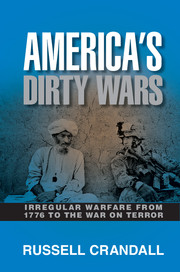Book contents
- Frontmatter
- Dedication
- Contents
- List of Figures
- Acknowledgments
- 1 Introduction
- 2 Irregular Warfare 101
- Part One The American Revolution to Chasing Sandino, 1776–1930s
- Part Two The Cold War, 1940s–1989
- Part Three Latin America and the Cold War, 1950s–1980s
- Part Four Post–Cold War, 1990s–2000s
- 26 Dirty Wars after the Cold War
- 27 Colombia
- 28 Iraq
- 29 Intermezzo
- 30 Post-9/11 COIN in the Philippines
- 31 Intermezzo
- 32 The Longest War
- 33 The Fall of Muammar Qaddafi, 2011
- 34 Intermezzo
- 35 Conclusion
- Epilogue “I Feel More Like a Monster”
- Notes
- Bibliography
- Index
Epilogue - “I Feel More Like a Monster”
Published online by Cambridge University Press: 05 July 2014
- Frontmatter
- Dedication
- Contents
- List of Figures
- Acknowledgments
- 1 Introduction
- 2 Irregular Warfare 101
- Part One The American Revolution to Chasing Sandino, 1776–1930s
- Part Two The Cold War, 1940s–1989
- Part Three Latin America and the Cold War, 1950s–1980s
- Part Four Post–Cold War, 1990s–2000s
- 26 Dirty Wars after the Cold War
- 27 Colombia
- 28 Iraq
- 29 Intermezzo
- 30 Post-9/11 COIN in the Philippines
- 31 Intermezzo
- 32 The Longest War
- 33 The Fall of Muammar Qaddafi, 2011
- 34 Intermezzo
- 35 Conclusion
- Epilogue “I Feel More Like a Monster”
- Notes
- Bibliography
- Index
Summary
He [a U.S. soldier in Iraq] thought of himself as a patriot who had enlisted in the Army for the noblest of reasons: to contribute and to make some kind of difference. Then he punched his first Iraqi in the face, and pushed his first Iraqi down the stairs. Now he was back in the United States, crying and telling his wife, Sascha, “I feel more like a monster.”
It is indeed true that in war there are no unwounded soldiers. And America’s dirty wars are no exception. The bombs that shred limbs also hammer brains. Post-traumatic stress disorder (or PTSD) is the mental health condition sparked by some type of isolated or sustained psychological terror or by traumatic brain injury, a physiological injury that occurs when the brain is rocked so violently that it collides with the inside of the skull yielding psychological damage.
A decade of dirty war battles in Iraq and Afghanistan wrought enormous psychological damage on American troops. Around two million Americans served in the two wars, many of whom were deployed multiple times. If the many medical studies prove accurate, roughly 500,000 of these servicemen and women will have developed PTSD in varying degrees. Further indicating the degree of post-combat issues, approximately half of the military personnel deployed to these two wars have requested disability benefits from the U.S. government. For comparison, only 21 percent of veterans of the Persian Gulf War in 1991 sought disability.
- Type
- Chapter
- Information
- America's Dirty WarsIrregular Warfare from 1776 to the War on Terror, pp. 471 - 472Publisher: Cambridge University PressPrint publication year: 2014



